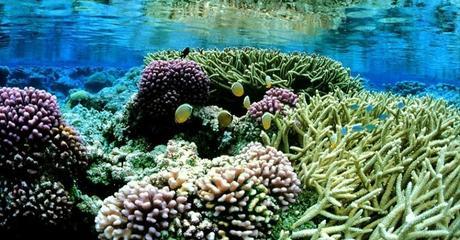by Andrea Germanos / Common Dreams

Coral gardens at Palmyra Atoll. (Photo: Jim Maragos/USFWS)
President Barack Obama announced on Thursday the creation of the world’s largest marine reserve.
The action expands the biodiversity-rich Pacific Remote Islands Marine National Monument, which covers seven atolls and islands, from roughly 87,000 square miles to 490,000 square miles.
That expansion falls short of what Obama proposed in June, which would have created a 782,000 square mile-reserve.
The action bans commercial fishing and “any appropriation, injury, destruction, or removal of any object” from the reserve. The Marine Conservation Institute outlines some of what will be protected:
- 130 seamounts: undersea mountains which can provide essential rest-stops for tunas and sea turtles migrating across thousands of miles of Pacific Ocean.
- Several million seabirds representing 19 species, many of which find the fish and squid they eat in the now-expanded marine monument waters.
- Habitat for whales and dolphins, including the newly discovered Palmyra beaked whale.
- Nearly-pristine coral reef ecosystems.
The U.S. Fish and Wildlife Services states that the areas within the Monument “represent one of the last frontiers and havens for wildlife in the world, and comprise the most widespread collection of coral reef, seabird, and shorebird protected areas on the planet.”
The Marine Conservation Institute joined a number of ocean conservation groups cheering the expansion.
“This unprecedented protection is an important step to rebuilding fishery abundance in the Pacific Ocean, which will in turn help to feed the world’s growing population,” stated Jacqueline Savitz, vice president for U.S. oceans at Oceana.
Emily Woglom, vice president for Conservation and Policy at Ocean Conservancy, said that “we all win by the Obama Administration creating the world’s largest marine monument, because protecting our ocean now is the investment that will pay dividends for generations to come. Science shows that protected areas in the ocean help rebuild fish populations, which is good for fishermen, and provide habitat for many unique ocean animals, including whales, sharks, tuna and corals.”
While the marine reserve is receiving accolades, the administration’s decision to allow exploration activities for oil and gas, including the use of seismic cannons, off the East Coast has been denounced as a potential “death sentence” for marine mammals.
“I just can’t understand how anybody would propose something that’s going to be just a rape of the East Coast, endangering whales and dolphins and turtles and fish,” McClatchy quotes Nags Head Mayor Bob Edwards as saying.

